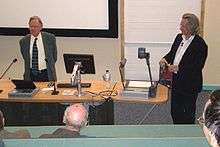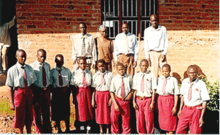North East Humanists


The Tyneside Group of the North East Humanists (NEH) was founded on 17 September 1957, although organised secularism in North East England had been active from the 1860s. The group adopted the name North East Humanists in 1997, after merging with the Teesside Humanist group.
NEH is a registered charity, consisting of over 200 members, and is the largest regional Humanist group in the United Kingdom. The group is involved in a wide range of activities including Humanist presentations to schools, campaigns and a varied selection of social events for members.
In common with the basic principles of Humanism, the NEH is concerned with values and moral issues from a non-religious viewpoint and with the achievement of a more open, just and caring society.
To mark the 50th anniversary of the foundation of the NEH, the group held a joint lecture with Newcastle University. On 4 October 2007 A. C. Grayling gave a lecture on 'Reason and the Good', in which he explored the view (rooted in Aristotelian thinking) that reflection and choice, both expressions of the exercise of reason, are essential to the good life, underlying both the meaning we give to it and the value we find in it.
History

The first meeting of the Tyneside Humanist Group, later to become NEH, was attended by ten people and was held on 17 September 1957 in Kirkstone Gardens, Newcastle upon Tyne. Mr F. R. Griffin addressed the meeting about his attendance at the Second Congress of the International Humanist and Ethical Union (IHEU) in London, and he moved that the ten people present constitute the Tyneside Humanist Group. This motion was seconded by Mr J.W. Alexander and carried unanimously.
On 22 October 1957, the first of a series of ten fortnightly lectures began at Cowan House in the University of Durham, with a lecture by Mr G. Leith on Philosophy. In April 1958 it was decided to arrange a programme of speakers which would include group members. An annual membership fee of 2 shillings and 6 pence was decided upon, with regular members contributing 1 shilling a week, and a fee for visitors.
In October 1958, Mr F. R. Griffin began a series of twelve fortnightly lectures at the British Legion Social Club on the Great North Road in Newcastle upon Tyne, where meetings were held until 16 December of that year. The first annual general meeting of the group was held here in May 1959, by which point there were 21 paid up members. In November 1959 the group agreed to send a £1 affiliation fee to the International Humanist and Ethical Union. The group began to organise various social events including theatre visits, and social evenings with games, films, prizes and gramophone record recitals.
BY 1970 the Tyneside Humanist Society were holding meetings at The Friends’ Meeting House in Jesmond, Newcastle upon Tyne. Neil Jenkins was President of the group with Alfred Hobson as Chairman, and both went on to author the book Modern Humanism in 1989.
During 1993, membership of the group had increased dramatically, and now stood at 60. At the annual general meeting of 1993, it was suggested that the group assume the title of North East Regional Humanist Association, continuing to operate as the Tyneside Group but prepared to act also as the Regional Association if requested.
In the spring of 1995 the first North-East Humanist Newsletter was published. In the summer of 1995 a Teesside Humanist Group was formed as branch of the Tyneside Group. In Autumn 1995 a motion was carried to change the group name to North East Humanists, incorporating both the Tyneside Humanist Group and the Teesside Humanist Group. Humanism in the North East continued to expand, with the paid up membership of the group at 114 by the beginning of 1996. By the summer of 1998, membership exceeded 150.
The first NEH regional conference was held on 12 May 2000 at Durham Castle, with Prof. David Cooper of the Durham University Philosophy Department as the keynote speaker. The group also launched a website this year.
Activities
The group holds meetings at the Broadacre House in Newcastle upon Tyne on the third Thursday of every month, featuring talks and discussions on ethical and social issues with visiting speakers. The group occasionally holds one-day regional conferences on Humanist subjects. Group members receive a monthly bulletin which includes articles, a programme of events and matters of current interest. A wide range of social events are organised for members and non-members, including garden parties, quiz nights, country walks and museum visits.
Beliefs
The main beliefs of the North East Humanists, as stated on their website, are:
- In common with other forms of life, human beings are part of an evolutionary process that began billions of years ago.
- There is no supernatural agency to which we can turn for instruction, justice, comfort, or support. The solutions to human problems are in the hands of humans alone.
- We acquire our moral values not from a supernatural source but from the groups and society that we grow up in.
- Men and women are responsible for their conduct and should have regard for the welfare of others.
- As far as we know, our life is the only one we will ever have.
- Human beings can lead happy, creative, fulfilling and meaningful lives whilst in this world.
The word 'belief' is used by the group in the sense of something believed, in the form of an opinion or conviction. This should not be confused with belief in the religious sense, meaning confidence in the truth or existence of something not immediately susceptible to rigorous proof, or belief in a certain religious tenet or set of tenets, more commonly referred to as faith.[1]
The group considered the IHEU Amsterdam Declaration of 2002, and believed it could be expanded to answer basic questions that frequently arise from group members, acquaintances and guests at meetings. To address this, a working party produced a discussion paper which was widely circulated.[2]
Charitable work
NEH became a registered charity in February 2006, their stated aims being to:
- Promote the mental and moral improvement of the human race by the advancement of the philosophy of humanism.
- Advance the education of the public in the philosophy of humanism.
- Promote charitable purposes.[3]
The group has an established fund-raising committee which researches charitable causes compatible with Humanist thinking, and organises events to raise money for these charities and for the group’s own campaigns.
If U Care Share Foundation
The group is currently supporting the If U Care Foundation.
Isaac Newton High School

The group supports the Isaac Newton High School at Kateera Village near Masaka, Uganda. The school was founded by Peter Kisirinya, a member of the Uganda Humanist Association, which is part of the worldwide International Humanist and Ethical Union. He bought land and built the first two classrooms with funds donated by his family and friends.[4]
A major aim of the school is to help disadvantaged children who cannot afford to pay fees for secondary education. These include orphans (many of whose parents died from HIV/AIDS), children in very poor families who cannot afford to pay fees and abandoned children who can be placed in foster homes around the school and can then receive education there.
By 2006 the school had over 80 pupils, of whom only half could afford tuition fees. To facilitate the tuition of orphans and other disadvantaged children at the school, the NEH set up a fund which in 2006 raised £2880 to support 24 students for a year. The school has also received a grant of €10,000 for the construction of a science laboratory. These funds were obtained by Peter Kisirinya from IHEU, to which the NEH is affiliated, and the Humanist Institute for Development Cooperation (HIVOS).[4] Fundraising for the school is ongoing, with money being raised through various charity events, such as quiz nights, bring and buy sales, coffee mornings and countertop collections.
Non-religious ceremonies
In recognition of the fact that those who choose to live without religion still wish to publicly mark important events in their lives, the NEH will put people in touch with accredited officiants, known as celebrants, to conduct non-religious weddings, baby namings, same sex affirmations and funerals.
See also
References
- ↑ belief – Definitions from Dictionary.com
- ↑ http://northeast.humanists.net/North%20East%20Humanist%20Values%20.pdf
- ↑ The NEH Application for Charity Status
- 1 2 The Uganda Humanist Scheme | International Humanist and Ethical Union
Further reading
- Modern Humanism by Alfred Hoburn and Neil Jenkins. First published in 1989 by Dene Books and updated by NEH.